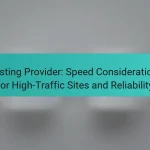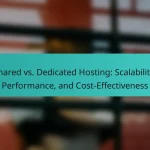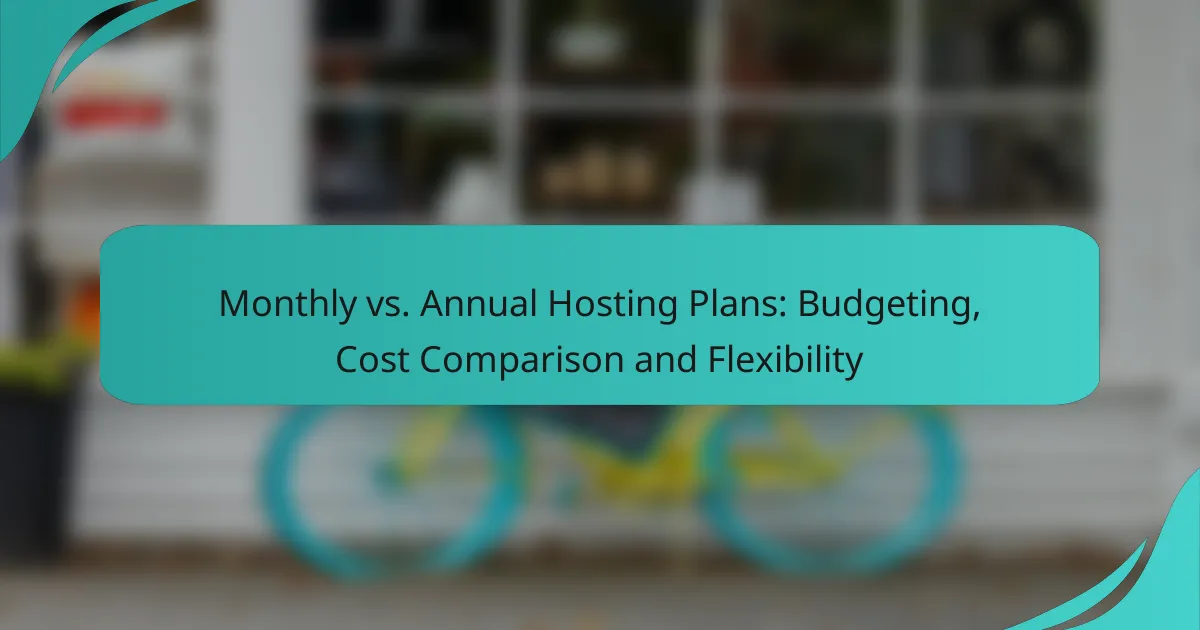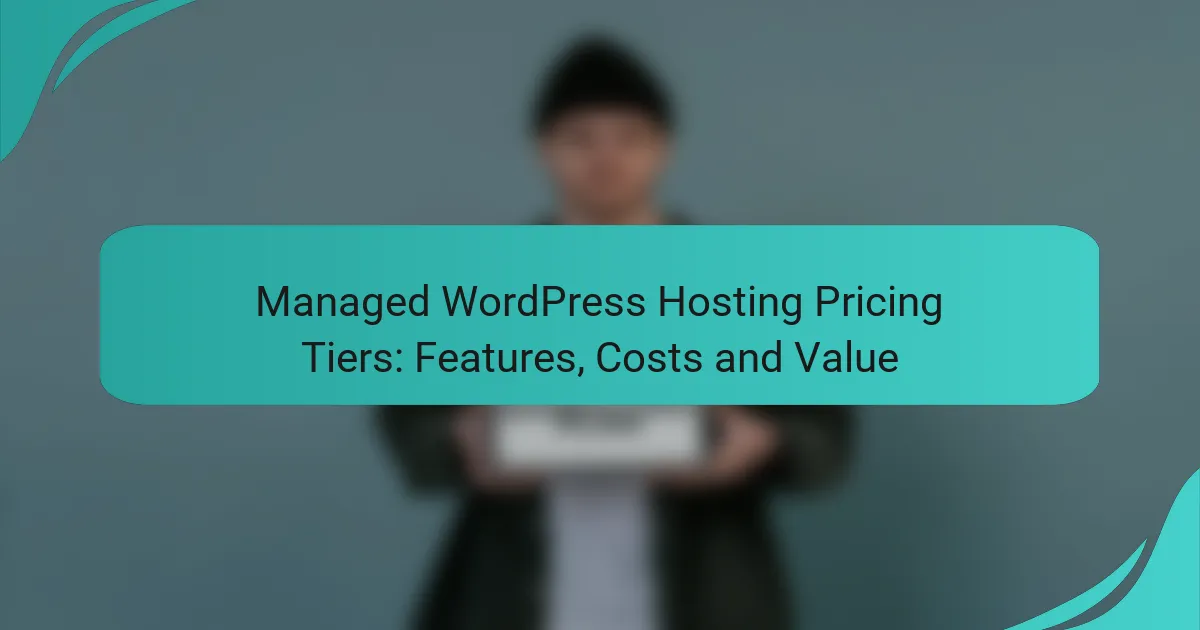When considering hosting services in Canada, it’s essential to understand that renewal rates can significantly vary depending on the type of hosting you choose. Shared hosting offers affordability, while dedicated hosting comes with higher costs due to enhanced resources and support. Effective budgeting for these services requires a clear assessment of current expenses and potential future changes, ensuring you can manage your long-term costs and maintain a sustainable online presence.

What are the expected hosting services renewal rates in Canada?
In Canada, hosting services renewal rates vary based on the type of hosting chosen. Generally, shared hosting is the most affordable, while dedicated hosting tends to be the most expensive, reflecting the level of resources and support provided.
Average renewal rates for shared hosting
Shared hosting renewal rates in Canada typically range from CAD 5 to CAD 15 per month. This type of hosting is suitable for small websites or blogs with moderate traffic, as multiple users share the same server resources.
When budgeting for shared hosting, consider potential increases in renewal rates after the initial term. Some providers offer promotional rates for the first year, which can lead to higher costs upon renewal.
Average renewal rates for VPS hosting
VPS hosting renewal rates usually fall between CAD 20 and CAD 80 per month in Canada. This option provides more dedicated resources compared to shared hosting, making it ideal for growing websites or applications that require better performance.
Keep in mind that VPS hosting often includes additional features such as enhanced security and scalability. As with shared hosting, initial promotional pricing may not reflect the renewal cost, so review the terms carefully.
Average renewal rates for dedicated hosting
Dedicated hosting renewal rates can range from CAD 100 to CAD 300 per month, depending on the server specifications and service level. This type of hosting is best suited for large businesses or high-traffic websites that need maximum performance and control.
When considering dedicated hosting, factor in the total cost of ownership, including potential setup fees and ongoing maintenance. It’s essential to evaluate your hosting needs and budget to ensure you select the right plan for your long-term goals.

How to budget for hosting services renewal?
Budgeting for hosting services renewal involves understanding the costs associated with your current plan and anticipating any changes. By evaluating key factors and creating a structured budget plan, you can effectively manage your hosting expenses.
Identifying key cost factors
When budgeting for hosting services renewal, consider several key cost factors. These include the base renewal rate, any additional features such as SSL certificates or backups, and potential increases in pricing based on your provider’s policies.
It’s also important to factor in any promotional rates that may expire upon renewal. Many providers offer introductory pricing, which can lead to a significant jump in costs after the initial term ends.
Creating a renewal budget plan
To create a renewal budget plan, start by listing all anticipated costs associated with your hosting services. Include the base renewal fee, additional features, and any taxes or fees that may apply. This will give you a comprehensive view of your expected expenses.
Next, set aside a contingency fund, typically around 10-20% of your total estimated costs, to cover unexpected increases or additional services you may need. Regularly review and adjust your budget based on your hosting needs and any changes in service offerings or pricing from your provider.

What are the long-term costs of hosting services?
The long-term costs of hosting services encompass not only the initial subscription fees but also renewal rates, potential upgrades, and additional expenses that may arise over time. Understanding these costs is crucial for effective budgeting and planning for your online presence.
Cost breakdown over multiple years
When evaluating the cost of hosting services over multiple years, consider both the base price and any increases upon renewal. Typically, introductory rates may be significantly lower than the standard renewal rates, which can rise by 20-50% after the initial term.
For example, if a hosting service starts at $5 per month, the renewal might jump to $10 or more. It’s wise to calculate the total cost over a three to five-year period to get a clearer picture of your financial commitment.
Hidden fees and additional charges
Many hosting providers impose hidden fees that can inflate your overall costs. These may include charges for domain registration, SSL certificates, backups, or exceeding bandwidth limits. Always read the fine print to identify these potential expenses.
For instance, some hosts may advertise low monthly rates but charge extra for essential features like email accounts or technical support. To avoid surprises, create a checklist of all potential fees and compare them across different providers before making a decision.

How to choose the right hosting provider for renewal?
Choosing the right hosting provider for renewal requires careful consideration of reliability, support, and pricing structures. Evaluate your current provider’s performance and compare it with alternatives to ensure you make an informed decision that aligns with your budget and long-term needs.
Evaluating provider reliability
Reliability is crucial when selecting a hosting provider, as downtime can significantly impact your website’s performance and user experience. Look for providers that offer at least 99.9% uptime guarantees, as this is a standard benchmark in the industry.
Check customer reviews and independent performance tests to gauge a provider’s reliability. Consider their infrastructure, such as data center locations and redundancy measures, which can affect service continuity. A reliable provider should also have a clear plan for handling outages and maintenance.
Comparing customer support options
Customer support is a vital aspect of your hosting experience, especially when issues arise. Look for providers that offer 24/7 support through multiple channels, such as live chat, phone, and email. This ensures you can get help whenever you need it.
Evaluate the quality of support by reading reviews and testing response times. Some providers offer dedicated account managers or priority support for higher-tier plans, which can be beneficial for businesses with specific needs. Always confirm the availability of resources like knowledge bases or community forums, as these can supplement direct support.

What are the benefits of renewing with the same hosting provider?
Renewing with the same hosting provider offers several advantages, including familiarity with their services and potential cost savings. Staying with a known provider can enhance reliability and simplify management.
Consistency in service quality
When you renew with the same hosting provider, you can expect a consistent level of service quality. This includes uptime reliability, speed, and customer support, which are critical for maintaining your website’s performance.
Familiarity with the provider’s infrastructure means you are less likely to encounter unexpected issues. You can also leverage existing knowledge about their interface and features, reducing the learning curve associated with switching providers.
Potential loyalty discounts
Many hosting providers offer loyalty discounts or incentives for renewing contracts. These discounts can significantly reduce your overall costs, especially if you opt for longer-term plans.
For example, some providers may offer discounts of 10-20% for renewing annually instead of monthly. Always check for promotional offers or loyalty programs that could further enhance your savings.

What are the risks of switching hosting providers?
Switching hosting providers can lead to several risks, including potential data loss and service interruptions. It’s essential to carefully plan the transition to mitigate these issues and ensure a smooth migration.
Data migration challenges
Data migration can be complex, particularly if the new hosting provider uses different technologies or platforms. Ensure you have a complete backup of your data before starting the migration process to avoid any loss. Consider using migration tools or services that can streamline this process and reduce the risk of errors.
Additionally, verify that all data, including databases, files, and configurations, are compatible with the new environment. Testing the migration in a staging environment can help identify potential issues before going live.
Downtime during transition
Downtime is a significant risk when switching hosting providers, potentially affecting your website’s availability and user experience. Plan the migration during off-peak hours to minimize the impact on users. Communicate with your audience about the transition to set expectations.
To reduce downtime, consider a phased migration approach where you transfer non-critical components first. Monitor the transition closely to address any issues promptly and ensure a swift return to full functionality.










